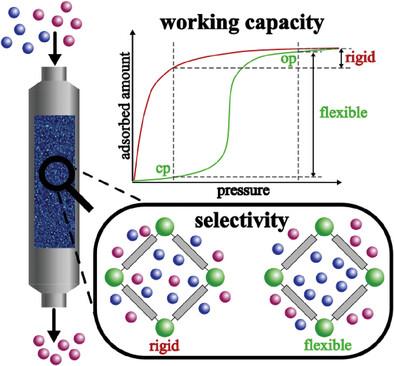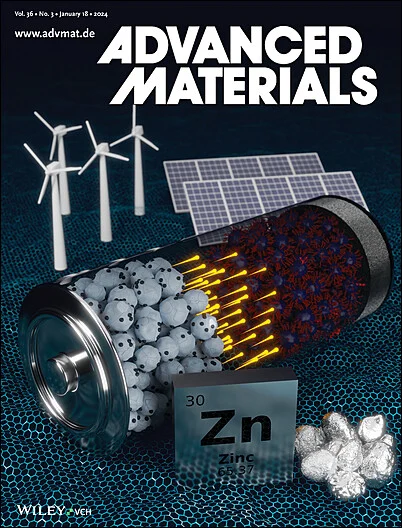柔性mof的吸附与分离
IF 26.8
1区 材料科学
Q1 CHEMISTRY, MULTIDISCIPLINARY
引用次数: 0
摘要
柔性金属有机框架(mof)由于其动态结构适应性提供了独特的机会。本文探讨了柔性对气体吸附的影响,重点介绍了气体储存和分离的关键概念。具体实例表明,灵活框架在提高气体吸收和工作能力方面的主要有效性。此外,对混合气体的吸附和分离进行了综述,展示了它们在选择性气体分离中的潜力。本文还讨论了单气体等温线分析和吸附条件在分离实验设计中的重要作用。先进的综合表征技术对于理解柔性mof的行为至关重要,包括监测相变、框架-客体和客体-客体相互作用。讨论了柔性吸附剂在实际应用中的关键挑战,如转换动力学、体积变化和相变过程中潜在的晶体损伤。此外,还讨论了添加剂和成型对柔性和“滑脱效应”的影响。最后,概述了相变除了提高工作能力和选择性之外的好处,并特别关注了固有热管理的优势。本文综述了柔性mof在气体储存和分离技术中的潜力和挑战,为未来的研究和应用提供了见解。本文章由计算机程序翻译,如有差异,请以英文原文为准。

Adsorption and Separation by Flexible MOFs
Flexible metal–organic frameworks (MOFs) offer unique opportunities due to their dynamic structural adaptability. This review explores the impact of flexibility on gas adsorption, highlighting key concepts for gas storage and separation. Specific examples demonstrate the principal effectiveness of flexible frameworks in enhancing gas uptake and working capacity. Additionally, mixed gas adsorption and separation of mixtures are reviewed, showcasing their potential in selective gas separation. The review also discusses the critical role of the single gas isotherms analysis and adsorption conditions in designing separation experiments. Advanced combined characterization techniques are crucial for understanding the behavior of flexible MOFs, including monitoring of phase transitions, framework–guest and guest–guest interactions. Key challenges in the practical application of flexible adsorbents are addressed, such as the kinetics of switching, volume change, and potential crystal damage during phase transitions. Furthermore, the effects of additives and shaping on flexibility and the “slipping off effect” are discussed. Finally, the benefits of phase transitions beyond improved working capacity and selectivity are outlined, with a particular focus on the advantages of intrinsic thermal management. This review highlights the potential and challenges of using flexible MOFs in gas storage and separation technologies, offering insights for future research and application.
求助全文
通过发布文献求助,成功后即可免费获取论文全文。
去求助
来源期刊

Advanced Materials
工程技术-材料科学:综合
CiteScore
43.00
自引率
4.10%
发文量
2182
审稿时长
2 months
期刊介绍:
Advanced Materials, one of the world's most prestigious journals and the foundation of the Advanced portfolio, is the home of choice for best-in-class materials science for more than 30 years. Following this fast-growing and interdisciplinary field, we are considering and publishing the most important discoveries on any and all materials from materials scientists, chemists, physicists, engineers as well as health and life scientists and bringing you the latest results and trends in modern materials-related research every week.
 求助内容:
求助内容: 应助结果提醒方式:
应助结果提醒方式:


